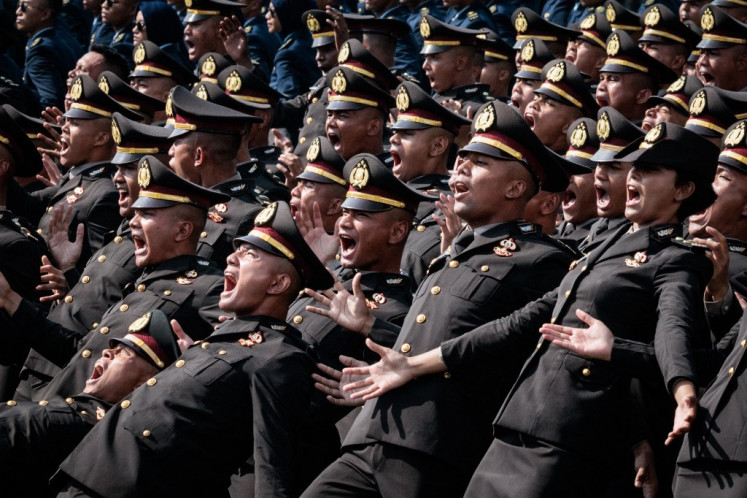Popular Reads
Top Results
Can't find what you're looking for?
View all search resultsPopular Reads
Top Results
Can't find what you're looking for?
View all search resultsASEAN needs to facilitate Myanmar-led dialogue process
The Jakarta Post’s Dian Septiari and Tri Indah Oktavianti spoke with Evan Laksmana, senior researcher at the Centre for Strategic and International Studies (CSIS) in Jakarta, to capture the tone of discussions ahead of the crucial ASEAN Summit at the weekend.
Change text size
Gift Premium Articles
to Anyone
A
head of the much-anticipated ASEAN Summit, where the region’s leaders are expected to discuss the political and humanitarian crisis in Myanmar, opinions are split between what the bloc should and can collectively do. The Jakarta Post’s Dian Septiari and Tri Indah Oktavianti spoke with Evan Laksmana, senior researcher at the Centre for Strategic and International Studies (CSIS) in Jakarta, to capture the tone of discussions ahead of the crucial meeting. The following are excerpts from the interview:
Question: What are your views about the prospects of the upcoming ASEAN summit on Myanmar? What can realistically be achieved?
Answer: So, right now, what we’ve had on the table for the last several weeks is Indonesia's proposal to implement and a commitment to [negotiate] a humanitarian pause that can end violence right now. Only after that can we deliver humanitarian aid facilitated by ASEAN, in particular through the AHA Center. Hopefully, we can then have enough space to allow ASEAN to facilitate a Myanmar-led and Myanmar-owned dialog process.
That's the most ideal outcome; that there is a commitment from an ASEAN-led mechanism to help address the crisis and a commitment to a framework to end the violence, deliver humanitarian aid, as well as potentially restart a dialog among all the stakeholders in Myanmar. I think that would be the best-case scenario.
But if your question is, what is likely to happen, realistically, I’m afraid that would be quite difficult [to answer] because, at this point, it's not clear to what extent Indonesia’s ideas have been discussed, conveyed and negotiated over the last several weeks. We hope that we can get a commitment.
The least ideal outcome is if the senior general of Myanmar comes [to the meeting] but there is no commitment; that he only comes, listens to the concerns expressed by other ASEAN leaders and representatives, and then conveys his plans and we all go home.
That wouldn’t be ideal because a meeting that only summarizes the expressed concerns or wishes is not sufficient; there has to be a commitment to engaging in a mechanism and a process to do something, at the very least. Without those commitments, I’m afraid it will be difficult to call the special leaders’ meeting a success.
What kind of leverage does Indonesia or ASEAN have that can help address the crisis?
There are a few different ways of thinking [with regard to this] question. Individually, Southeast Asian countries have different leverages, interests and engagements with Myanmar. Singapore and Thailand, for example, have very different and much more expansive economic and security ties; Indonesia less so. Individually the leverage would be different across the board.
But collectively, ASEAN as a group, hopefully, we can offer a few things. We can offer humanitarian assistance; we have AHA Center and can pool resources together to provide aid to the people of Myanmar. We also have a sense of familiarity that we bring to the table. The regime of Myanmar and ASEAN have been working closely [...] and hopefully, we don't come with an intrusive political agenda in a way that we are acceptable to Myanmar, both the regime as well as the people of Myanmar.
After all, in the past few decades, ASEAN has provided diplomatic cover for Myanmar as well, in shielding Myanmar from international sanctions or condemnation. It may not always be successful, but we believe we have stayed with Myanmar over the years. And we hope that in this dire hour of need for Myanmar, it will once again welcome ASEAN’s efforts.
There are concerns over the representation of Myanmar at the meeting. How important is it to have representation for the people of Myanmar at the summit?
The legitimacy of representation is not up to ASEAN to decide; it is only up to the people of Myanmar to decide. But if the situation does not improve, the violence doesn't stop and the humanitarian aid can't be delivered, then ASEAN can't facilitate a dialogue among all stakeholders, which is the goal of the summit. If the goal of the summit, first and foremost, is to stop and end the violence, then we have to talk to the party committing the violence. In this regard, only the military is engaging in violence right now [...] This in no way – in any way, shape or form – confers legitimacy to the military junta.
Even in the meetings among the foreign ministers a month and a half ago, we still recognized the reality but we didn’t decide on the legitimacy. So, the summit and its current representation by the senior general is not an acknowledgment of legitimacy; it is the recognition of the reality that the first goal of the summit is to end violence. And the party committing the violence is the military.










